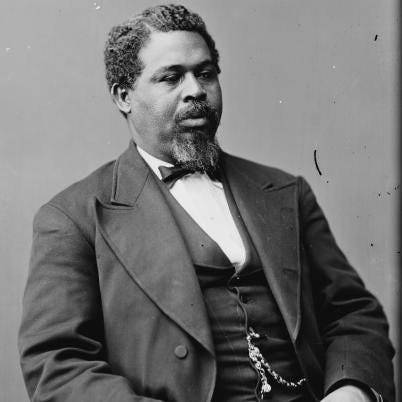You are viewing the article Robert Smalls at Tnhelearning.edu.vn you can quickly access the necessary information in the table of contents of the article below.

(1839-1915)
Who Was Robert Smalls?
Robert Smalls was an enslaved African American who escaped to freedom in a Confederate supply ship and eventually became a sea captain for the Union Navy. After the war, he became a successful businessman and politician serving in both houses of the South Carolina legislature. He was elected to the U.S. House of Representatives in 1875 but was convicted of taking a bribe while in the state senate and sentenced to prison before he was pardoned by the governor.
Early Life
Smalls was born to a house enslaved person, Lydia Polite, in Beaufort, South Carolina, on April 5, 1839. The identity of his father is not officially known but believed to be Henry McKee, the son of the plantation’s owner. Smalls was raised in the McKee house and enjoyed a little more acceptance in the community. On several occasions, he ignored the night curfew for Black people and stayed out with his white companions, much to his mother’s lament.
When Smalls was 12, the McKee family moved to Charleston, where Smalls was hired as a day laborer on the waterfront, working as a rigger and eventually a sailor. In 1856, he married Hannah Jones, an enslaved hotel maid who worked in Charleston. Jones already had one daughter, and together she and Smalls had a daughter and a son, Robert Jr., who later died of smallpox. Smalls’s attempts to buy his wife and family out of slavery failed.
Gunboat Deckhand
At the outbreak of the Civil War, in March 1861, Smalls was hired as a deckhand on the Confederate supply ship the Planter, a converted cotton steamer that carried supplies between forts in Charleston Harbor. Over the course of several months, Smalls learned all he could about navigating the ship and waited for an opportunity to escape.
Escape
In the predawn hours of May 13, 1862, while the white officers and crew slept in Charleston, Smalls and a crew of eight men, along with five women, and three children (including Smalls’s wife and two children), quietly slipped the Planter out of Charleston Harbor. Over the next few hours, Smalls successfully navigated the ship through five checkpoints, offering the correct signal to pass each, and then headed out to open waters and the Union blockade. It was daring and dangerous, and if caught, the crew was prepared to blow up the vessel.
The startled crew of the USS Onward, the first ship in the blockade to spot the Planter, almost fired on it before Smalls had the Confederate flag struck and raised a white bed sheet, signaling surrender. The ship’s treasure of guns, ammunition, and important documents proved to be a wealth of information, telling the Union commanders of shipping routes, mine locations and the times that Confederate ships docked and departed.
Wartime Hero and Spokesperson
The story of the courageous escape of Smalls became a national phenomenon and was one of the factors encouraging President Abraham Lincoln to authorize free African Americans to serve in the Union military. Congress bestowed a $1,500 cash prize on Smalls, and he went on a speaking tour, recounting his heroics and recruiting African Americans to serve in the Union Army. During the rest of the war, Smalls balanced his role as a spokesperson and Union Navy captain on the Planter and the ironclad USS Keokuk, conducting 17 missions in and around Charleston.
Postwar Life in Business and Politics
After the war, Smalls was commissioned as a brigadier general in the South Carolina militia and purchased his former owner’s house in Beaufort, South Carolina. He generously took in some of the McKee family, who were destitute. Smalls started a general store, a school for African American children and a newspaper. His success opened doors in politics, and soon he served as a delegate to the state’s constitutional convention and was elected to both the South Carolina House of Representatives and the State Senate. Between 1874 and 1879, served in the United States House of Representatives, but his tenure was marred by partisan accusations that he took a $5,000 bribe while in the state senate. In 1877 Smalls was convicted of the offense and sentenced to three years in prison. Smalls was released pending his appeal, however, and in 1879 he was pardoned by the governor.
Later Life and Death
After his first wife’s death in 1883, Smalls remarried in 1890. He served as a U.S. Customs collector in Beaufort from 1889 to 1911 and remained active in politics. Smalls died of natural causes in his Beaufort home on February 23, 1915, at age 75.
QUICK FACTS
- Name: Robert Smalls
- Birth Year: 1839
- Birth date: April 5, 1839
- Birth State: South Carolina
- Birth City: Beaufort
- Birth Country: United States
- Gender: Male
- Best Known For: Robert Smalls was an enslaved African American who became a politician, serving in both the South Carolina legislature and the U.S. House of Representatives.
- Industries
- War and Militaries
- Astrological Sign: Aries
- Death Year: 1915
- Death date: February 23, 1915
- Death State: South Carolina
- Death City: Beaufort
- Death Country: United States
Fact Check
We strive for accuracy and fairness.If you see something that doesn’t look right,contact us!
CITATION INFORMATION
- Article Title: Robert Smalls Biography
- Author: Biography.com Editors
- Website Name: The Biography.com website
- Url: https://www.biography.com/political-figures/robert-smalls
- Access Date:
- Publisher: A&E; Television Networks
- Last Updated: January 19, 2021
- Original Published Date: April 2, 2014
Thank you for reading this post Robert Smalls at Tnhelearning.edu.vn You can comment, see more related articles below and hope to help you with interesting information.
Related Search:



